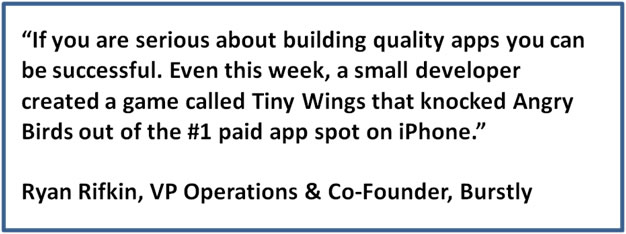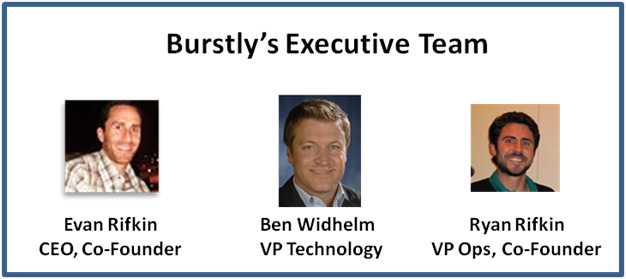
 Messenger: Ryan Rifkin, Co-Founder & VP of Operations, Burstly, Co-Founder & Sr. Director of Partnerships at TagWorld/Flux (sold to Viacom)
Messenger: Ryan Rifkin, Co-Founder & VP of Operations, Burstly, Co-Founder & Sr. Director of Partnerships at TagWorld/Flux (sold to Viacom)
Value Prop Twitter Style: Burstly is: “A monetization platform for iOS and Android app developers”
If you haven't already subscribed yet, subscribe now for
free weekly Infochachkie articles!
10) Ryan, why does the world need Burstly?
“Unlike the web, there aren’t tools in place to effectively manage and measure all of the revenue opportunities on mobile. Without a good management system, its impossible to know what types of ads are making you the most money. Therefore, mobile developers are losing money simply by not having complete transparency and control of this space. We built Burstly to solve this problem. ”
9) I know that when you and your Co-Founder, Evan Rifkin, started Burstly, one of your primary goals was to NOT create yet another ad network (ala Traffic Marketplace). How is Burstly explicitly different from a traditional ad network and in what ways is it similar?
“Ad networks typically power a portion of each app’s ad inventory and monetization. Burstly gives app developers the control to manage 100% of their inventory by working with multiple ad network partners, cross-promoting their own titles, and selling their inventory directly to advertisers. ””
8 ) You recently launched something you call "Storefront": what is it, and how will it enhance your value prop?
“The storefront provides an automated solution for selling inventory directly to advertisers. Advertisers love this because it gives them transparency into where their ads are running. This adds value to the apps because they own the direct relationship with their advertisers at a rate that is higher than what they make from ad networks, albeit on a smaller percentage of their inventory.”
7) There are clearly significant differences between websites and mobile apps with respect to design, attracting users and monetizing them. Do you have any advice for developers moving from the Web to mobile? Any particular tips and tricks that you have seen work especially well in the mobile world?
“Freemium all the way. You get the benefit of increased distribution and can still effectively monetize users through a combination of advertisements, in-app purchases, upsells to a paid app, and cross-promotion of new titles.”
6) There seem to be a lot of paid apps that are moving to a freemium model. What tips and tricks should developers keep in mind as they build their next apps?
“Create an engaging experience in the app and build in multiple ways to monetize your user base. Ads are one piece of the equation, but in-app purchases are crucial to increasing revenue per user. Burstly actually leverages the ad space to promote in-app purchases with a click to purchase option. We then track this revenue in our reporting dashboard and attach an eCPM to this cross-promotional inventory.”

5) The app developer world has recently gone through a wave of M&A activity (e.g., acquisition of NEWTOY by Zynga). Do you think the maturation of the market will make it easier or more difficult for small, independent app developers to come out of nowhere and create a “hit”?
“It’s so early in the space that despite the consolidation, if you are serious about building quality apps you can be successful. Even this week, a small developer created a game called Tiny Wings that knocked Angry Birds out of the #1 paid app spot on iPhone. ”
4) TechCrunch published an article in June of 2010 which attempted to diagnose why the Airhorn App, created by Burstly developer Alex Miyamura, made it to the top spot of Apple’s App Store. The author concludes that, “we’ll never know” what drove the app’s astounding ascendency. Have you learned any insights in the months since that article was written that might be helpful to would-be app hit makers?
“Unfortunately, we don't have any additional insights on this particular app.”
3) A number of app developers will never introduce third party ads onto their apps, as they feel it distracts from the user experience. However, if they reject ads entirely, they may be missing a huge opportunity to cross-promote their own apps. Have you seen such cross-promotion work with any of your developers and, if so, what sort of lift can such in-app ads produce?
“Amassing a large user base and cross-promoting is crucial to successfully launching new titles. This doesn’t necessarily need to happen through traditional ad space, though. Burstly encourages people to create custom ad sizes so cross-promotion can happen in non-traditional ad placements with all of the same control and reporting you would expect from an ad. All of this functionality is turn-key from the Burstly dashboard.”
2) Burstly now serves ads in both the Apple and Android marketplaces. Do you see any difference between the types of apps which are successful in each marketplace?
“The types of apps that do well are actually very similar on both platforms. As big titles on iOS move over to Android they inevitably see success.”
1) What are the ideal characteristics of an app developer that can benefit from Burstly’s offering and how can such developers join your program?
“There are tons of characteristics, but the simplest way to narrow down who we are looking for is anyone that treats mobile apps as a full-time business. To get started, simply go to Burstly.com and sign up.”
Liftoff: Rapid fire answers to various irrelevant questions:
Bocce ball or horseshoes? “Baggo”
Coma or paralysis? “Neither. Make a decision and keep moving. ”
Steak or lobster? “Rib eye, medium rare”
Shaken or stirred? “Scotch neat”
Most played song on your iPod “Anything off of the new Radiohead album”
______________________
John Greathouse has held a number of senior executive positions with successful startups during the past fifteen years, spearheading transactions which generated more than $350 million of shareholder value, including an IPO and a multi-hundred-million-dollar acquisition.
John is a CPA and holds an M.B.A. from the Wharton School. He is a member of the University of California at Santa Barbara’s Faculty where he teaches several entrepreneurial courses.
______________________
Copyright © 2007-11 by J. Meredith Publishing. All rights reserved.




